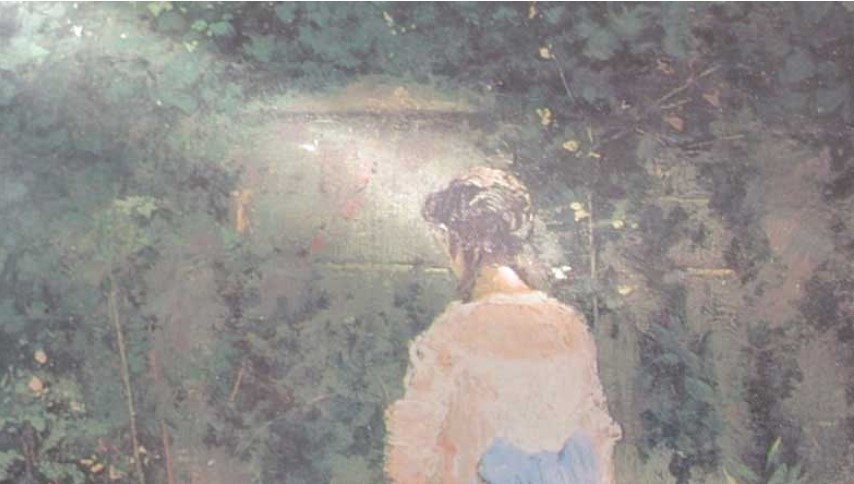A reading of the final 2-pages of the book (a detail of the front-cover artwork of which is reproduced right there).xxxxxxxxxxxxxxxxxxxxxxxxxxxxxxxxxxxxxxxxxxxxxxxxxxxxxxxxxxxxxxxxxxxxxxxxxxxxxxxxxxxxxxxxxxxxxxxxxxxxxxxxxxxxxxxxxxxxxxxxxxxxxxxxxxxxxxxxxxxxxxxxxxxxxxxxxxxxxxxxxxxxxxxxxxxxxxxxxxxxxxxxxxxxxxxxxxxxxxxxxxxxxxxxxxxxxxxxxxxxxxxxxxxxxxxxxxxxxxxxxxxxxxxxxxxxxxxxxxxxxxxxxxxxxxxxxxxxxxxxxxxxxxxxxxxxxxxxxxxx
Taking the following paragraph as a whole:
'What has come of it all - of all that I had hoped for? And now when the shades of evening are beginning to close upon my life, what have I left that is fresher, dearer to me, than the memories of that brief storm that came and went so swiftly one morning in the spring?'
Leads to the conundrum: to what does the perplexity following from this refer?: 'But I do myself an injustice.'
It is because 'Even then, in those light-hearted days of youth, I did not close my eyes to the mournful voice which called to me, to the solem sound which came to me from beyond the grave.' Which is to say that he cannot simply allow himself the liberty of the intitial agreement to tell the tale of his first love according to the following at the very onset of the novella:
'Well, then, that's agreed,' he said, settling himself more deeply into his armchair and lighting a cigar. 'Each of us is to tell the story of his first love.'
Rather, being honest with himself in his older age and where he's ended-up in his life, he realizes that his decision to allow himself to foresee the possibility of reconciling himself to his lover later on in life at a better time belies a more fundamental relationship with life that he has refused in his unending quest to ensure he lives, rather, towards death (as his ownmost potential of his 'life').
And yet, this is still not the full story, the full phenomenology of his relationship with life and death through love, as the text concludes:
'I remember how serveral days after that on which I had learnt of Zinaida's death, I myself, obeying an irresistbile impulse, was present at the death of a poor old woman who lived in the same house with us. Covered with rags, lying on bare boards, with a sack for a pillow, her end was hard and painful. Her whole life was spent in a bitter struggle with daily want, she had had no joy, had never tasted the sweets of happiness - surely she would welcome death with gladness - its deliverance - its peace? Yet so long as her frail body resisted obstinately, her breast rose and fell in agony under the icy hand that was laid upon it, so long as any strength was left within her, the little old woman kept crossing herself, kept whispering 'Lord forgive me my sins ...' and not until the last spark of consciousness had gone, did the look of fear, of the terror of death vanish from her eyes ...'
Only in his youth could the expanse of life sprawl out ahead of him as still endlessly full of possibilities for the realization of the most perfect union according to the most properly ordered context which would support it and nurture it in its most full expression one day always further ahead of the present moment. As such, it is a relationship with life that always already forecloses what it offers in the hope of a better day, a day not so far ahead as to seem impossibly distant; but a day so far ahead that it seems like its always already here already. Until it is:
'And I remember that there, by the death-bed of that poor woman, I grew afraid, afraid for Zinaida, and I wanted to say a prayer for her, for my father - and for myself.'
That, rather than a pseudo 'love' that bifurcates and sequentializes a decision-making with respect to formulaic self-preservation(and the imagined future moment of togetherness the so-called poetry that a discursive interaction writ-large should produce but that becomes rationalized according to its utility as a sociological ploy)--the strange courage that's necessary to live through what is offered in love, knowing that, rather than the rationalizable comfort of a guaranteed life of death that deludes itself about its ending, what is offered is a chance at life, that, as an actual life, is one that comes with the concomittant risk that the life provided might once again eventually devolve back into a death.
Hence, the simple wager throughout history that this story takes aim at: think again before you itemize the projected returns of love or allow superficial interventions to construe it as someone else's privelage or expertise or more appropriate bequethal, because it is life itself that love gives access to. And it is, furthermore, only by having gotten a life that one can ever hope to actually share a world with another human-being(which is the biloxy-bind, so to speak).
So, point in point: fetishize life, and put a positive spin onit whenever you've got the chance. Or die waiting for the Big-Top to come crumblin' down? No! To FALLLLLLL (with ALL your hopes and 'prayers' to comfort you as you face your mortal SINNNNNNNnnnnnnnn\\><=.
